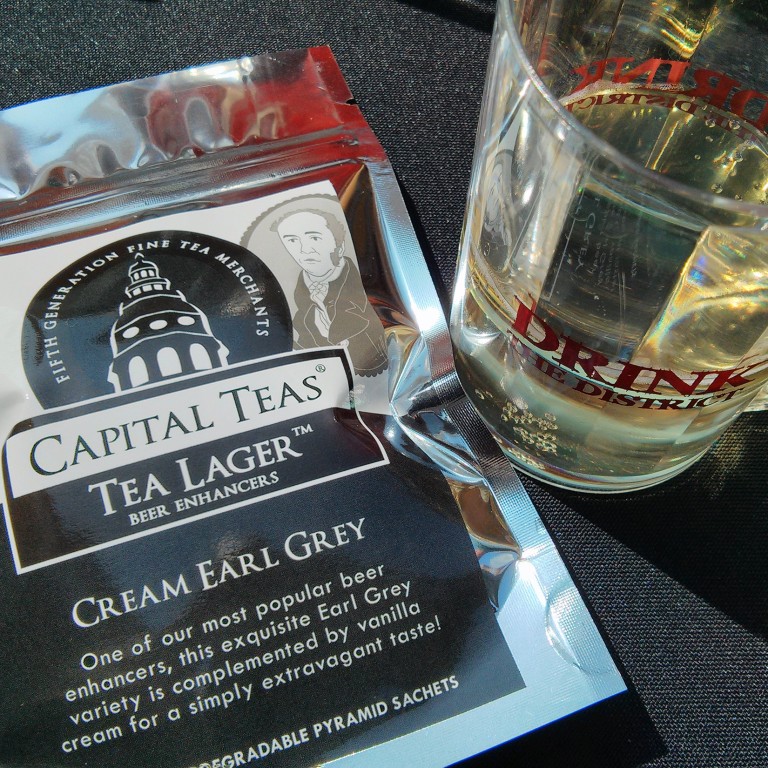
A different brew: tea bags marketed as flavour enhancer for beer
A Budweiser made so floral you'd want to bathe in it? Beer with a caffeine hit to keep you awake as you quaff? This American fad might just catch on
Peter Martino, chief executive of Capital Teas, had just closed a deal with the US Naval Academy for a custom tea blend and was wondering whether other colleges might be interested in their own unique brand.
Then the epiphany hit him: "I suspected that at most colleges, people drink more beer than tea."
Martino scooped up 24 bottles of different beers and spent an evening steeping sachets in foaming mugs instead of cups of hot water. "The tea totally changed the character of the beer," he recalls.
The result: Tea Lager Beer Enhancers, 10 organic blends available separately or in a sampler pack of five. Each foil packet contains six tea bags, with instructions to dangle one sachet in 330ml of beer for 5 to 10 minutes. (You can leave it in longer for extra flavour, but too long an exposure turns the beer cloudy and flat.)
I bought a couple of large cans of beer at a local convenience store and experimented to see what kind of salvage job the teas could do on mass-market yellow lager. Cream Earl Grey, combining bergamot orange and vanilla, added body and a smooth, citrusy flavour to an otherwise wan and watery Coors Light. Provence Rooibos, which promised "ripe berry notes" and "mild lavender," contributed such a floral bouquet to a glass of Budweiser that my friend and co-taster wanted to bathe in it. My own impulse was to dunk a sachet in a hoppy ale and pair it with Thai or Indian takeaway meal.
Indeed, Martino’s beer enhancers are also useful for customising a pint of craft beer. Genmaicha, a traditional Japanese blend of green tea and roasted rice kernels, adds a layer of toastiness to the even-keeled, toffeelike sweetness of Devils Backbone Vienna Lager.
As Martino sees it, tea has three effects on beer. First, it tends to block the sensory pathways that detect bitter, making the beer taste sweeter.
Second, the tea makes the beer foam up, purging excess carbon dioxide that would otherwise wind up in the drinker’s stomach.
Finally, the tea delivers a mild hit of caffeine. Martino says he and his wife took a few packets to the Munich Oktoberfest last fall and used them to dose liter steins of Paulaner and Hofbrauhaus. He credits the tea with keeping them wide awake to enjoy the amusement park rides after they left the beer tents. "We did the bumper cars after five or six litres of beer," he laughs.

For drinkers who want to avoid caffeine, Martino offers several uncaffeinated, ersatz tea blends.
The beer enhancers are sold by mail in the United States. A foil pouch of six sachets costs US$5.
Craft brewers might want to take note. Coffee beers are ubiquitous, tea beers much scarcer. That’s because craft beer drinkers prefer bolder flavours, speculates Matt Brophy, brew master and chief operating officer for Flying Dog Brewery in the US state of Maryland. "They want to take a sip and say, ’Wow! That’s coffee!’ Tea is more subtle. It tends to blend in with the beer."
Capital Teas’ biggest rival for the allegiance of beer drinkers might be a fledgling business called Hop Theory. Beginning in July, Hop Theory, based in the US city of Baltimore, plans to offer its own flavour-augmenting sachets containing orange peel, coriander and Cascade hops. Chief executive Bobby Gattuso recently raised US$25,000 on Kickstarter and plans to follow up with raspberry, pumpkin and double IPA versions. One pouch will contain 12 sachets at a suggested retail price of US$14.95, and Gattuso says each sachet can transform up to four 330ml beers.
A 25-year-old biology major at Towson University, Gattuso was inspired by the bare-bones budgets of college students. "One aspect of craft beer," he says, "is that at US$6, US$7 or US$8 a bottle, it becomes unaffordable for many people." But it’s hard to go back to budget brews once you get a taste of better beer. Steep his product in the mass-market stuff, however, and "it truly transforms a light beer", Gattuso says.
